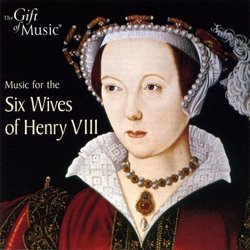| All Artists: Sara Stowe;Matthew Spring;Jon Banks;Martin Souter Title: Six Wives of Henry VIII Members Wishing: 1 Total Copies: 0 Label: The Gift of Music Release Date: 2/3/2005 Genre: Classical Style: Symphonies Number of Discs: 1 SwapaCD Credits: 1 UPC: 658592101027 |
Search - Sara Stowe;Matthew Spring;Jon Banks;Martin Souter :: Six Wives of Henry VIII
 | Sara Stowe;Matthew Spring;Jon Banks;Martin Souter Six Wives of Henry VIII Genre: Classical
Music for the Six Wives of Henry VIII Henry VIII was a musician and music lover. This album of cheerful songs and dances brings together some of Henry's own compositions with the best Renaissance music from England and the... more » |
Larger Image |
CD Details
Synopsis
Product Description
Music for the Six Wives of Henry VIII Henry VIII was a musician and music lover. This album of cheerful songs and dances brings together some of Henry's own compositions with the best Renaissance music from England and the continent, reflecting the taste of each of Henry's wives and giving a lively impression of Tudor court life. Spanish, French, Italian and English music - including many pieces by Henry VIII himself - in a programme designed to reflect the tastes and characters of Henry's wives. Cheerful songs, dances and reflective pieces give an impression of court life and the music that was made and composed there. Many of the pieces are taken from a manuscript which was written during the reign of Henry VIII and which contains many of the King's own compositions. Henry VIII's turbulent loves and life are famous. It is not so often remembered, however, that court life had its own rhythms and occasions which continued throughout all the confusion and turmoil of the King's personal problems. Music was a major feature of that court life, and this included marvellous, soaring choral music to match the superb ecclesiastical buildings that Henry VIII built or worshipped in. But court life also included more secular, domestic music-making in which the king himself took an important part. He was an accomplished composer, as the works on this album will show, and it is clear that he liked music, and that it was one of his many accomplishments as one of the most cultured and intellectually gifted monarchs that the English throne has ever seen. The pieces on this album have been grouped together here to represent each of Henry's wives - hence the distinctly Spanish style of the opening few tracks, which are for Catherine of Aragon. Each section of music ends with a quiet, gentle piece (a 'Consort'), written by Henry, and which are dotted about throughout the manuscript. Anne Boleyn was educated in France, so the pieces for her are French in style. Helas madame is a love song by Henry. And I were a mayden reflects her youth when she became Queen. Pastime with good company, which we have placed with Jane Seymour, is probably Henry's most famous composition, along with Greensleeves, a beautiful melody which is often attributed to the king's pen. Anne of Cleves has her European dance, and a Flemish song from Obrecht, one of the greatest European composers of the time. Catherine Howard's music is more rustic, with echoes of the countryside and the royal ritual of hunting. Le pied de cheval is from an English manuscript, despite its French title, and is sometimes known as the Horse's Brawl. Catherine Parr's music features some traditional English tunes and a beautiful Italian fantasia, first published in 1536, which Henry may have played to her.

 Track Listings (24) - Disc #1
Track Listings (24) - Disc #1